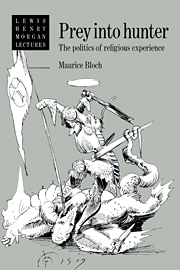5 - Marriage
Published online by Cambridge University Press: 15 December 2009
Summary
In the previous three chapters the theme of ‘rebounding violence’ has been examined in very different parts of the world and has been seen to be present in such varied ritual phenomena as sacrifice, initiation, spirit possession and funerary rituals.
The dramatic representation of rebounding violence in rituals often utilises animals closely associated with humans in order to achieve its effect. Most often these are domesticated animals. This is because such animals can serve to represent identification at one moment and alienation at the next. In the rituals these animals initially evoke non-transcendental vitality in humans and the driving out of this element from the subject's body is dramatised by chasing and finally killing the animal. Once the animal has been killed, its significance in the ritual can be transformed so that the very same animal now merely represents an external vitality, which is consumed by the participants as food, though this is regarded as extremely special and strength-giving food. It is this potential for symbolic transformation which is the key to the role of such animals in ritual.
Thus we saw how for the Dinka killing an animal, an action equated with the ‘killing’ of the innate cattle aspect of the human sacrificer, brought him or her close to Divinity because, without the cattle element, the sacrificer was left with only the other element of which human beings consist: pure, disembodied, truth-carrying speech, which is a manifestation of Divinity. Because a human being is not alive without the vital cattle element, the residual divine had to be recombined with vitality to make the sacrificer an active person again.
- Type
- Chapter
- Information
- Prey into HunterThe Politics of Religious Experience, pp. 65 - 84Publisher: Cambridge University PressPrint publication year: 1991

